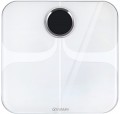Units of measurement
Weights are able to keep records in various units of measurement, while accounting can be done both by mass and by volume. Among the most common units of measurement, we highlight the following.
— Grams (g) — a unit of weight that belongs to the metric system. Grams are used in desktop kitchen scales.
— Kilograms (kg) — a unit of weight that belongs to the metric system. Kilograms are used in floor weighing equipment.
— Pounds (lb:oz) is a common unit of weight used in some countries in Europe, as well as in the United States. 1 pound can be equated to 0.45 kilograms.
— Milliliters (ml) — a unit of volume that belongs to the metric system. Some models of scales are able to determine the volume of milk and water based on mass.
— Ounces (fl'oz) is a unit of volume used in English-speaking countries. 1 US ounce is equivalent to 30 mL.
— Stones (st) is the British unit of weight. Stones are used to take into account the mass of the human body, so this measurement system is found in floor household and specialized diagnostic scales. 1 stone can be equated to 6.35 kilograms.
Memory
The number of users that can be stored in the device's memory.
Memory storage for multiple users is predominantly present in floor models of scales (as indicated in "Type of scales"), particularly those with advanced diagnostic functionalities (although the latter is not a mandatory requirement). These scales can store data for each user across multiple measurements, often including time and date stamps for each reading. Furthermore, these designs might include additional features, such as tracking changes in various parameters since the last measurement.
The choice of memory size depends on the number of users whose data needs to be stored. So, for family use, a device designed for 3 to 4 people is usually enough; less often 6 – 8 memory cells may be required. And the most "capacious" modern scales allow you to store data for 16 – 20 users; this can be useful, for example, for a sports team or a sanatorium group.
User auto-detection
The capability for scales to automatically "recognize" the user is present in advanced floor models with diagnostic functionalities.
User identification involves analyzing a range of parameters, beginning with actual weight and extending to the composition of different types of bodily tissues. This feature necessitates an initial measurement session, during which the scales "learn" and subsequently automatically identify the user for future use. Modern models are designed with the understanding that certain diagnostic parameters of an individual may change over time. Consequently, these scales can accurately identify a previously memorized user even if specific body characteristics like liquid percentage or fat content have notably altered. However, this identification isn't completely infallible; even sophisticated scales can occasionally confuse individuals with similar body indicators. Nevertheless, such occurrences are rare, and in most cases, this function is highly reliable.
Guest mode
The presence
of a guest mode in scales with memory for several users (see above). This function, in accordance with the name, is intended for cases when the balance is used by a "guest" — a person who does not need to be entered into the permanent memory of the device (and who should not have access to it). The results of "guest" measurements are displayed once, are not stored in memory and do not affect its contents. This mode can be useful not only directly for guests, but also in other situations — for example, to demonstrate or check the capabilities of scales in a store before buying

